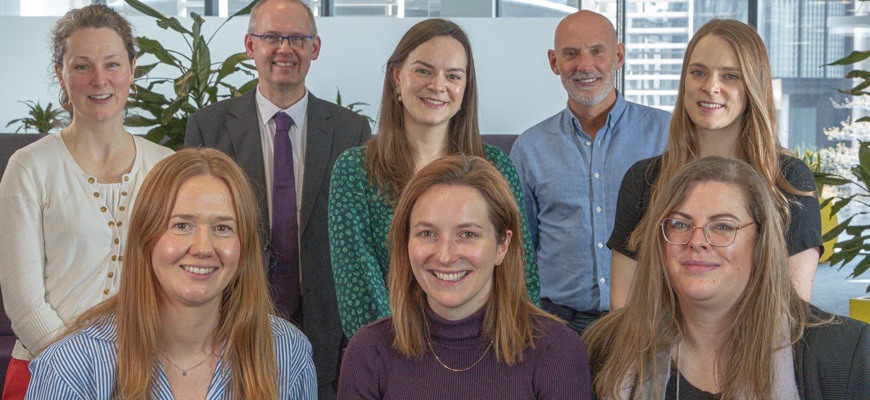Climate action? Start here

Climate change is one of the most pressing issues of our time, but for legal professionals wondering how they can help, it can be hard to know where to start.
After the Society’s Council passed a climate resolution, the recently formed Sustainability Committee (pictured) set its sights on helping every corner of the legal sector by producing a climate action resource hub.
With the effects of climate change being seen around the globe and the issues coming under the spotlight at COP-28, from its inception the committee has prioritised tangible, practical action through the resource hub.
In the ever-evolving landscape of environmental responsibility, the hub has been designed to support legal professionals by: (1) signposting useful resources to help firms and organisations consider potential changes they can make to reduce their carbon footprint; (2) suggesting ways in which climate-consciousness may be built into client advice; and (3) recognising the increasing prevalence of climate anxiety and the need for individuals to address the impact of the crisis on their own wellbeing.
Strategies for all
The hub is by the legal profession, for the profession. As the President, Sheila Webster said: “The climate crisis is not just an issue for larger firms, but one which needs to be tackled by every corner of the Scottish legal system.” To that end, the Society recognises that many larger firms and in-house teams have well developed ESG (environmental, social and governance) strategies, but smaller firms may lack resources to create and implement their own strategies. For that reason, elements of the resource hub have been specifically targeted at smaller firms who are looking for ways to mitigate their environmental impact.
Committee member Anne Littlejohn, partner at Raeburn Christie Clark & Wallace, observed: “SMEs will play an integral role in society’s drive to net zero. For business owners the task may seem overwhelming, especially at a time when they are facing higher overheads, taxes and workforces with similar domestic issues. However, there are various ways we can all tackle this challenge if we break the task down into manageable targets. The benefits from reducing your carbon footprint are not just environmental: they can foster greater employee satisfaction, attract people (both staff and clients) to your business, and in some cases reduce costs.”
Change is hard, but as the magnitude and urgency of the climate crisis continues to grow, it becomes increasingly necessary.
Peter Brash, partner at Grigor & Young and also on the committee, commented: “It’s easy to get overwhelmed by the apparent scale of climate change, and on some days I do. But I try to focus on taking small steps in the right direction, both personally and in business. Most people understand that adapting our behaviour is a journey and not everything can be made perfect immediately. I think people – whether clients, employees or the general public – just want to know that firms are taking their duty of care seriously. Talking openly about opportunities, initiatives and progress in relation to sustainable practices is a great way to initiate action. It’s what I hope the resource hub will help to foster.”
In-house angle
Working in-house can present its own challenges when having agency over your organisation’s ESG methods, and in all areas of working life it can be easy to think that the climate crisis is not something we can tackle individually at work.
As committee member Hannah Gardner, legal counsel in the Outsourcing, Technology & IP team at NatWest, put it: “As a technology lawyer I didn’t initially feel there were obvious links between my day job and supporting ESG initiatives. This was just not true! I have learnt during my years at NatWest where we can use our influence to promote meaningful change, such as my team’s work with the Chancery Lane Project on using our contracts to monitor the bank’s scope 3 emissions. Working with the committee has further fueled my desire to share these learnings with the profession.
“We are proud of the content we have pulled together for the resource hub and I would love it to be part of a success story where we have influenced real meaningful change through being part of the Society. We hope the hub will grow and inspire as we continue to learn.”

On a journey
With the climate crisis, collaboration is key. No single action or approach is enough, yet working as a community, the legal profession can effect positive change. The resource hub, together with CPD training and events run by the committee and the Society can, if members choose, lead to a sustainability journey that produces meaningful results for individuals, firms, in-house teams, and clients, across the country.
There is no doubt that climate change is intimidating and there is a large mountain to climb when it comes to seeing positive results. However, raising awareness, having conversations and making a start on doing things differently, can have considerable effects not only within our legal system but beyond.
Find out more on the Society's climate hub.
If you, your firm or your in-house team want to join the conversation by sharing your experiences of sustainability (whether challenges or successes), please get in touch with the Sustainability Committee by emailing sustainability@lawscot.org.uk
Regulars
Perspectives
Features
Briefings
- Criminal court: Boundaries of corroboration
- Corporate: Deceptive digital design – no clever cookie?
- Agriculture: Ending LDTs in a second short continuation
- Succession: Attorney as executor?
- Sport: Is that in the rules?
- Scottish Solicitors' Discipline Tribunal: December 2023
- In-house: The real deal
- Intellectual property: Making your mark with a sound





